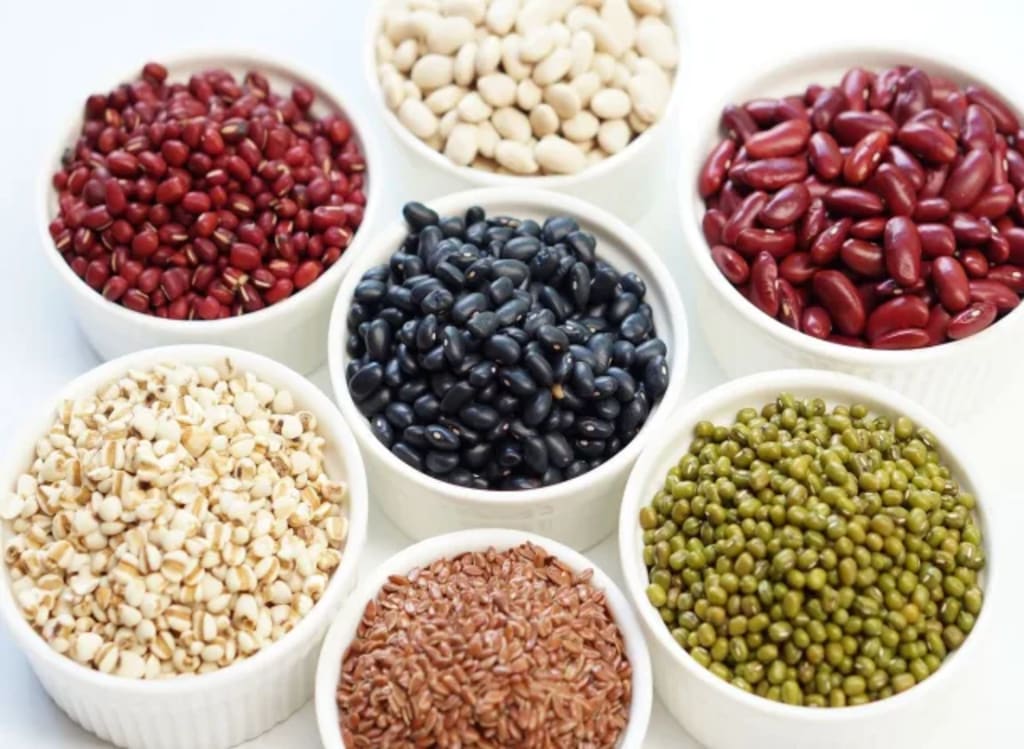
Cholesterol can be perplexing. Do you recall the results of your recent blood test? Do you know what your heart health status is? Because cholesterol can be confusing, most people would probably answer "no" to both queries. Furthermore, your elevated cholesterol could be inherited rather than the result of lifestyle choices.
You can improve your statistics and your health by modifying your diet with or without cholesterol-lowering drugs, whether your bad cholesterol profile is genetically linked or the result of poor diet and exercise habits. Simply embrace the eating habits that science has shown are associated with good cholesterol levels. Many of the same dietary strategies can have a favorable impact on your health in a variety of ways.
What different types of cholesterol are there?
Let's have a better knowledge of what cholesterol is and how it affects our health before we look at the eating habits linked to healthy cholesterol. Cholesterol is a waxy fat-like substance that travels through your bloodstream on lipoproteins throughout your body. It resembles fat, but it is not fat. You can't burn it off like you can fat with exercise. (However, exercise has a significant impact on the composition of cholesterol in your system; more on that later.) Cholesterol is produced and regulated by your liver, and it is also obtained through the foods you eat.
In your body, there are two types of cholesterol-carrying lipoproteins. Because high levels of low-density lipoprotein, or LDL, are linked to an increased risk of heart disease, it is sometimes referred to as "bad" cholesterol. HDL, or high-density lipoprotein, is characterized as "good" cholesterol because it transports LDL cholesterol to the liver, where it is eliminated.
Scientists have recently discovered a subtype of LDL that appears to be more harmful to the cardiovascular system. It's known as small, dense low-density lipoprotein cholesterol (sdLDL-c), and it's linked to high triglycerides (a type of blood fat), low levels of the good HDL, obesity, and metabolic syndrome (a group of disorders linked to heart disease and diabetes). The problem with small dense LDL particles is that they are more likely to adhere to the endothelium, the lining of blood arteries, where they can form a plaque that can break off and generate a clot, which can lead to a heart attack or stroke. (If you're over 50, you might be interested in learning about the Side Effects of High Cholesterol After 50.)
1 They eat oatmeal for breakfast.
"I have a family history of high cholesterol," says nutritionist Christina Laboni, MhSc, RD, "therefore I am careful of my diet and have managed to keep my cholesterol in a reasonable level without any drugs."
Steel-cut oats are her go-to breakfast. "Oatmeal includes soluble fiber, which helps lower LDL cholesterol levels in our blood," she explains. "Many people with high cholesterol will talk about items to cut out or avoid, which has its place, but it's always better to focus on what you can add to your diet rather than what you can take away. Because steel-cut oats are the least processed and take the longest to cook, I usually make a large batch to reheat throughout the week."
Three to four grams of soluble fiber consumed daily has been demonstrated in trials to help decrease LDL cholesterol by nearly 10%.
You don't have to eat oatmeal to get more soluble fiber. "Breakfast is a great way to start the day because you may choose from a variety of plant-based fiber alternatives that can help lower LDL 'bad' cholesterol and improve HDL 'good' cholesterol," says Amber Ingram, RD, a registered dietitian at The Ohio State University Wexner Medical Center. "The skin and peels of fruits, vegetables, and legumes contain soluble fiber."
2 They stay away from sugary drinks.
"It's becoming evident that genetics play a significant part in how the body handles cholesterol," says Trista Best, RD, a registered dietitian at Balance One Supplements and a professor of nutrition.
Avoiding sugar-sweetened beverages (SSBs) such as soda, juice cocktails, sugary alcoholic cocktails, and sweet teas and coffees may help lower your cholesterol. Best cites a 12-year study published in the Journal of the American Heart Association that included 6,000 people and concluded that higher SSB consumption was linked to high cholesterol, including alterations in the good HDL cholesterol and triglyceride levels.
3 They supplement with psyllium.
The average American diet falls short of the recommended dietary fiber intake of 21 to 25 grams per day for women and 30 to 38 grams per day for men. It's especially tough to get enough of the soluble kind. If you're having trouble getting enough fiber, try taking a fiber supplement like psyllium husks.
"Similar to oatmeal and beans, psyllium husk is a great source of soluble fiber, and soluble fiber helps lower cholesterol by binding to cholesterol in the gut so that it is eliminated during bowel movements rather than being reabsorbed into the body," says Veronica Rouse, RD, a registered dietitian who specializes in lowering cholesterol with food in her practice and on her blog The Heart Dietitian.
Psyllium husk powder can be mixed into juice or other liquids. In the gut, it produces a thick gel that keeps you feeling full. It also comes in the form of bars and capsules. People who consumed 10 grams of psyllium husk daily for three weeks had considerably lower LDL cholesterol (by 13 mg/dL), according to a study published in The American Journal of Clinical Nutrition in 2018.
4 They prefer walnuts to doughnuts as a snack.
Fats are necessary for good health, however a type of fat known as trans-fatty acid is bad for your cholesterol. According to Alyssa Burnison, RD, LN, a registered dietitian with Profile Plan, trans-fatty acids found in packaged and highly-processed foods like cookies, crackers, fried foods, pastries, and other baked goods designed for a long shelf life raise total and LDL cholesterol levels while lowering the good HDL.
Walnuts, on the other hand, are high in a plant-based version of heart-healthy omega-3 fatty acids, which have been demonstrated to decrease total cholesterol and triglycerides, according to her. She claims they're a terrific snack for quelling hunger. Just be aware that nuts are high in calories.
5 They focus healthy fats and eat more plant-based proteins.
According to Young, people with lower cholesterol "enjoy more plant-based proteins like beans, lentils, and tofu rather than red meat, which is heavy in saturated fats."
According to the Mayo Clinic, saturated fat raises LDL cholesterol levels.
"This isn't to say you shouldn't eat fats," she explains, "but it's better to eat unsaturated fats like olive oil and avocado instead of butter and cheese."
Limit saturated and trans fats in fatty meats, deli meats, milk, ice cream, coconut oil, palm oil, commercially baked products, and deep-fried takeaway foods, according to Steve Theunissen, RDN, a veteran certified personal trainer and writer for SmartFitnessResults.com.
6 They consume more seafood.
Fatty fish such as salmon, sardines, tuna, herring, and bluefish are high in heart-healthy omega-3 fatty acids, which have been shown to lower triglycerides, a type of blood fat that, like cholesterol, contributes to the risk of heart disease. While omega-3s do not lower LDL cholesterol, according to Laboni, "some studies suggest they can assist improve our HDL good cholesterol."
Laboni, who is concerned about her own high cholesterol, says she eats fatty fish at least twice a week and advises her clients to do the same.
7 Flaxseeds are added to yogurt, cereal, and smoothies.
Flaxseed, which is abundant in alpha-linolenic acid (ALA), a plant-based omega 3, is another great option to obtain extra heart-healthy fat in your diet. Flaxseed also has a lot of soluble fiber. However, another flaxseed component, lignans, a polyphenol found in plants that contain phytoestrogens, appears to be particularly efficient at lowering cholesterol.
The effects of two flaxseed bars with identical ALA content but varying quantities of lignans were investigated in a small research including 37 men and women published in the Journal of the American College of Nutrition. The high lignan bars caused the most substantial effect, with a 12 percent reduction in total cholesterol and a 25% reduction in LDL, according to the six-week, randomized, double-blind, placebo-controlled research. Lignans have antioxidant and anti-inflammatory qualities, and have been related to a lower risk of breast cancer death.
8 They consume plant sterol-fortified meals.
By limiting cholesterol absorption in the digestive system, plant sterols and stanol esters lower blood cholesterol levels. They're natural substances present in plant cell membranes, thus eating fruits and vegetables will provide you with them. Unfortunately, consuming fruits and vegetables does not provide nearly enough of an influence on cholesterol, so food makers have fortified items like orange juice and butter-like spreads with them.If you don't want to take cholesterol-lowering prescription drugs like statins, try Benecol spread, which contains plant stanols. A six-month supplementation of participants' diets with a plant stanol ester spread lowered LDL cholesterol and, in particular, the tendency of LDL droplets to form on arterial walls, according to an American Heart Association journal study. Read Best Supplements for High Cholesterol, According to Nutritionists for more information on various over-the-counter heart protection.





Comments
There are no comments for this story
Be the first to respond and start the conversation.